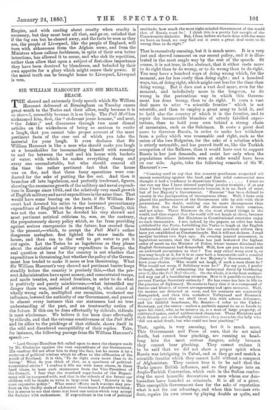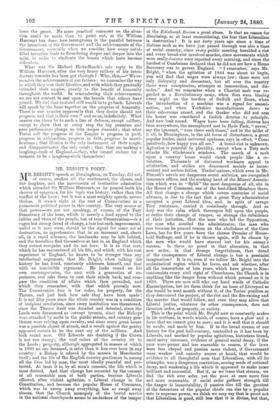SIR WILLIAM HARCOURT AND SIR MICHAEL BEACH. T HE shrewd and
extremely lively speech which Sir William Harcourt delivered at Birmingham on Tuesday causes great wrath to the Tories and their allies, really because it is so shrewd, ostensibly because it is so lively. The Pall Mall has nicknamed him, first, the " ci-devant jeune homme," and next, " the Jokist ;" and discourses through two most dismal articles on the wickedness of being so anxious to excite a laugh, that you cannot take proper account of the most pertinent facts of the case out of which you take the material for your laugh. It even declares that Sir William Harcourt is like a man who should make you laugh at a householder for incommoding himself with running to and fro between the well and his house with buckets of water, with which he makes everything damp and every one uncomfortable, but who should conceal all the time the rather pertinent fact that the house was on fire, and that these fussy operations were con- ducted for the sake of putting the fire out. And then it branches off into lugubrious, and perfectly irrelevant, figures, showing the enormous growth of the military and naval expendi- ture in Europe since 1865, and the relatively very small growth of English military and naval expenditure in the same time. That would have some bearing on the facts, if Sir William Har- court had devoted his satire to the increased precautionary expenditure of England on the Army and Navy. Clearly, this was not the case. What he devoted his very shrewd and most pertinent satirical criticism to, was, on the contrary, the preposterously showy policy which, so far from providing against serious emergencies in the future, has created them in the present,—which, to accept the Pall Mall's rather dangerous metaphor, first lighted the straw inside the house, and then ran to the well to get water to put it out again. Let the Tories be as lugubrious as they please about the statistics of military expenditure in Europe, the real question at issue for the country is not whether that expenditure is threatening, but whether the policy of the Govern- ment has tended to make it more or less threatening. What Sir William Harcourt's very shrewd and pertinent banter keeps steadily before the country is precisely this,—that the pre- sent Administration have spent money, and concentrated troops, and made treaties, and seized frontiers, in order to do what is positively and purely mischievous,—what intensified any danger there was, instead of attenuating it, what aimed at wholly wrong ends, multiplied our enemities, weakened our influence, lowered the authority of our Government, and proved in almost every instance that our statesmen had no true understanding of the past, and no trustworthy notion of the future. If this can be done effectually by ridicule, ridicule is most wholesome. We believe it has been done effectually by ridicule, and that the extreme sensitiveness of the Pall Mall and its allies to the prickings of that ridicule, shows itself in the wild and disordered susceptibility of their replies. Take, for instance, the following passage from Sir William Harcourt's speech Lord George Hamilton felt called upon to meet the charges made by Mr. Gladstone against the vast expenditure of the Government. His nandour did not allow him to deny the fact, but he meets it by a sentence of political wisdom which be offers to the edification of the youth of Scotland. It is this, To do right costs more than to do wrong.' What do you think of that, as a specimen of political- economical ethics ? I confess it fills me with some alarm, in these hard times, to hear such statements from the Vice-President of the Council. I fear that the standard copy-books of the Depart- ment Win be tampered with, and that in the schools of the future our children will be taught to write in large-text hand, Honesty is the most expensive policy.' What moral effects such maxims may pro- duce on the thrifty souls of adolescent Scotchmen I shudder to think ; but it seems to me that there is at least one nation which may accept the doctrine with enthusiasm. If expenditure is the test of political
rectitude, how much the most right-minded Government of the world that of Russia must be ! I think this is a pretty fair sample of the Conservative dialectic. But, I fear, before we have done with the wars we have on hand, we may find out it costs a great deal more to do wrong than to do right."
That is excessively amusing, but it is much more. It is a very just and shrewd comment on our recent policy, and it is illus- trated in the most ample way by the rest of the speech. Of course, it is not true, in the abstract, that it either costs more to do right than to do wrong, or to do wrong than to do right. You may have a hundred ways of doing wrong which, for the moment, are far less costly than doing right ; and a hundred ways, too, of doing right, which might cost less for the time than doing wrong. But it does cost a vast deal more, even for the moment, and indefinitely more in the long-run, to do wrong in the pretentious way in which this Govern- ment has done wrong, than to do right. It costs a vast deal more to seize "a scientific frontier" which is not scientific, and then to employ a great army to hold it, and to hold also the country of which it is the frontier, and to repair the innumerable blunders of utterly falsified expec- tations, than to hold your own behind a strong chain of mountains, such as the Suleiman. It costs a great deal more to threaten Russia, in order to make her withdraw from a policy which was reasonable and right, such as the union of the two Bulgarias, for the sake of a solution which is utterly untenable, and has proved itself so, like the Turkish occupation of the Balkans, than it would have cost to support Russia in her just demands, and resist her only when the populations whose interests were at stake would have been on our side. Again, take the following remarks of Sir W. Harcourt's :— " Canning used to say that the country gentlemen suspected wit meant something against the land, and that solid commercial men thought it had a tendency to depreciate Consols I trust no one can say that I have uttered anything jocular to-night ; if at any time I have lapsed into unconscious humour, it is no fault of mine, but of her Majesty's Government. Humour' has been defined to consist in the juxtaposition of incongruous ideas. Well, I have only placed the performances of the Government side by side with their pretensions. No doubt, nothing can be more incongruous than that. But then the humour of the situation is their creation, and not mine. These Ministers do the most absurd things in the world, and then expect that the world will not laugh at them, because they are Ministers. But Ministers in Constitutional countries enjoy no such immunities. I see, indeed, by the papers, an edict has been published by the Porte, forbidding the Turks to laugh at the English Ambassador, and that appears to be the one practical reform they have yet established at Constantinople. But it will not do here. I read another incident two days ago. An evening journal announces, in lugubrious accents, that the Sultan has just bestowed the highest order of merit on the Minister of Police, whose instant dismissal the English Government had demanded. Well, how are you to treat such an awkward occurrence as that ? You may either weep over it, or you may laugh at it, for it is at once both a lamentable and a comical illustration of the proceedings of her Majesty's Government. You have your choice. Who would not laugh, if such a man there be ? Who would not weep, if Salisbury were he ?' For my part, I prefer to laugh, instead of exhausting the lachrymal ducts by blubbering over it, like the Pall Mall Gazette. On the whole, it is the least undigni- fied way oat of a humiliating situation. How is it possible to treat the present Foreign Secretary seriously ? He has come too late in life to the practice of diplomacy. He seems to fancy that it is a compound of finesse and bluster, of secret arrangements and open menaces. Well, his secrets are detected at once, and his menaces are constantly disregarded, and then this maladroit Talleyrand and Bismarck
manqué expects that wo shall treat him with solemn deference, and his faithful henchman, Mr. Bourke—I refer to the Under- Secretary, not the orator—makes a pathetic appeal to us at Leeds to spare his chief, who, as he assures us, is a man of largo property, of cultivated tastes, and of unblemished character. These Ministers and their friends are so dreadfully sensitive; they resemble the lady who did not mind death, but who could not bear pinching.' "
That, again, is very amusing, but it is much more. This Government and Press of ours, that do not mind death, but cannot bear pinching, are running us head- long into the most serious dangers, solely because they cannot bear pinching. They cannot endure it to be said that we did not show a proper spirit when Russia was intriguing in Cabul, and so they go and snatch a scientific frontier which they cannot hold without a conquest of Afghanistan. They cannot bear it to be said that the Turks ignore British influence, and so they plunge into an Anglo-Turkish Convention, which ends in the Sultan confer- ring the most honorific decorations on men whom our Am- bassadors have branded as criminals. It is all of a piece. This susceptible Government does for the sake of reputation what is not for our advantage, and when this becomes evi- dent, repairs its own errors by playing double or quite, and loses the game. No more practical comment on the situa- tion could be made than to point out, as Sir William Harcourt has done, how incongruous is the parallel between the intentions of the Government and the achievements of the Government, especially when we consider how every unful- filled intention leads to floundering deeper and deeper into the mire, in order to vindicate the boasts which have become ridiculous.
What was Sir Michael Hicks-Beach's sole reply to Sir William Harcourt, after the very heavy raillery of his intro- ductory remarks has been got through V Why, this,—" We re- member the achievements of our fathers ; we remember the way in which they won their liberties, and with which they gradually extended their empire, greatly to the benefit of humanity throughout the world. In remembering their achievements, we are not content to rest upon the laurels that others have gained. We feel that to stand still would be to go back. Liberals will speak by the hour together on the progress of humanity. There is one country apparently that they desire should not progress, and that is their own ;" and so on, indefinitely. What answer can there he to such a line of defence, except raillery, except to show that at every step the big promises and poor performance plunge us into deeper discredit ; that what Tories call the progress of the Empire is progress in peril, progress in animosities, progress in debt, progress in morti- fications ; that illusion is the only instrument of their magic, and disappointment the only result ; that they are making a laughing-stock of England,—they, who cannot endure for a moment to be a laughing-stock themselves! -



































 Previous page
Previous page